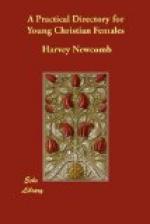Another fruit of the Spirit is JOY. We are commanded to rejoice in the Lord at all times. If we have a proper sense of the holiness of God’s moral character; of the majesty and glory of his power; of the infinite wisdom which shines through all his works; the infinite rectitude of his moral government; and especially of that amazing display of his love, in the work of redemption—it will fill our hearts with “JOY UNSPEAKABLE AND FULL OF GLORY.” Nor is rejoicing in God at all inconsistent with mourning for sin. On the contrary, the more we see of the divine character, the more deeply shall we be abased and humbled before him. Says Job, “I have heard of thee by the hearing of the ear; but now mine eye seeth thee. Wherefore, I abhor myself, and repent in dust and ashes.” It was a sight of God which brought this holy man so low before him.
Another fruit of the Spirit is PEACE. This is of two kinds; peace with God, and peace with man. The impenitent are at war with God; there is therefore no peace for them. God is angry with them, and they are contending with him. But the Christian becomes reconciled to God through Christ. He finds peace in believing in him. The Lord is no longer a God of terror to him, but a “God of peace.” Hence the gospel is called the “way of peace;” and Christ the “Prince of Peace.” Jesus, in his parting interview with his beloved disciples, says, “Peace I leave with you, my peace I give unto you.” Righteousness, or justice and peace, are said to have met together and kissed each other. “We have peace with God, through our Lord Jesus Christ.” The Bible is full of this subject, but I cannot dwell upon it. I wish you to look out the following passages; read and compare them diligently, and meditate upon the blessed truth which they contain Ps. 37:37; 85:8; 119:165. Prov. 16:7. Isa. 20:3; 57:19. Lu. 2:14. John 16:33. Rom. 8:6; 14:17. 1 Cor. 7:15. Eph. 2:11, 15. Phil. 4:7. Col. 3:15.
I know not how to speak of this exercise of the mind. It is better felt than described. It is a calm and holy reconciliation with God and his government; a settled feeling of complacency towards everything but sin. It begets a serene and peaceful temper and disposition of the heart. But this gracious work of the Holy Spirit does not stop with these exercises of the mind. However we may seem to feel, in our moments of retirement and meditation, if this peaceful disposition is not carried out in our intercourse with others, and our feelings towards them, we have reason to suspect ourselves of hypocrisy. Whatever is in our hearts will manifest itself in our conduct. If we exercise a morose, sour, and jealous disposition towards others; if we indulge a censorious spirit, not easily overlooking their faults; if we are easily provoked, and irritated with the slightest offence; if we indulge in petty strifes and backbiting—surely the peace of God does not rule in our hearts.




